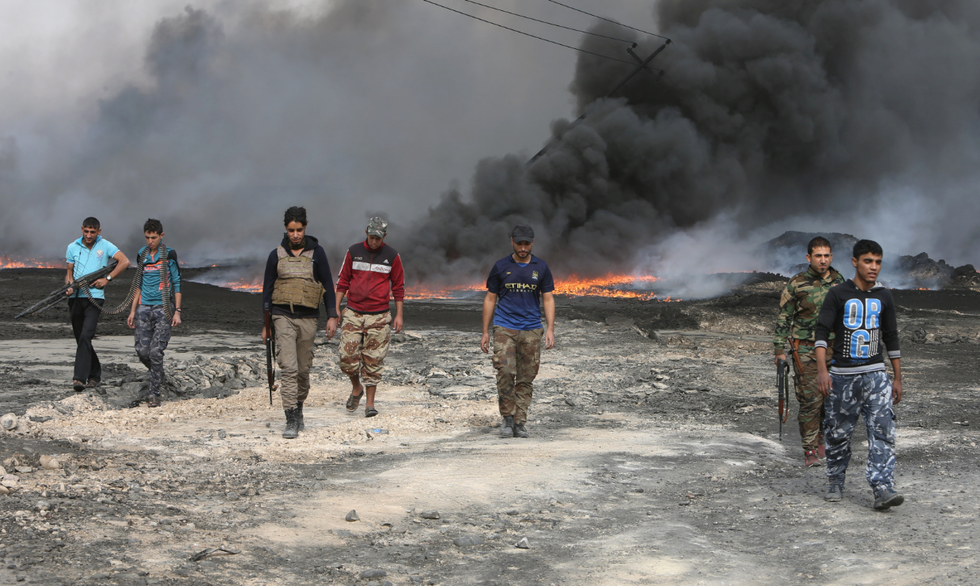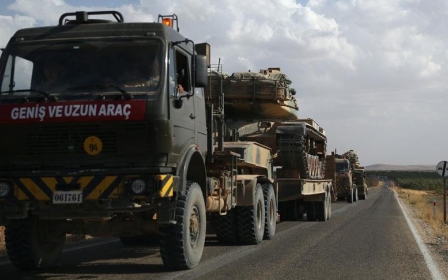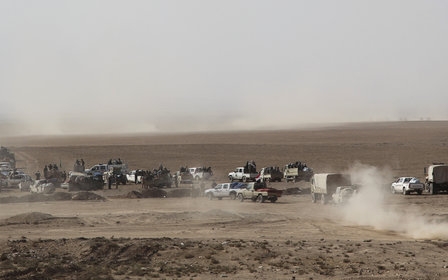Iraqi forces near IS ‘execution’ site in push on Mosul; al-Baghdadi vows no retreat

US-backed Iraqi forces on Wednesday moved near a town south of Mosul where aid groups and regional officials say the Islamic State (IS) executed dozens of prisoners who refused to act as human shields, as leader Abu Bakr al-Baghdadi called on his militants to resist.
"Do not retreat," said a voice presented as belonging to al-Baghdadi in an audio message released early on Thursday by the IS-affiliated Al-Furqan media. "Holding your ground with honour is a thousand times easier than retreating in shame," he said in the message, his first in more than a year. It was not clear if the IS leader was in Mosul or elsewhere.
A military statement said security forces advanced to the edge of Hammam al-Alil after an elite unit breached the eastern limits of Mosul, the ultra-hardline group's last major city stronghold in Iraq.
The battle that started on 17 October with air and ground support from a US-led coalition is shaping up as the biggest in Iraq since the US-led invasion of 2003.
Mosul still has a population of 1.5 million people, more than any of the other cities captured by IS two years ago in Iraq and neighbouring Syria.
The UN cited reports on Tuesday that IS was attempting to displace Hammam al-Alil's estimated population of 25,000 for use as human shields and protection against air and artillery strikes.
"We have grave concerns for the safety of these and the tens of thousands of other civilians who have reportedly been forcibly relocated by ISIL in the past two weeks," U.N. human rights spokeswoman Ravina Shamdasani said, using another term for IS.
The town, 15km south of Mosul, had a pre-war population of 65,000, a local official said.
Aid organisations, local officials and Mosul residents have cited reports that IS has executed dozens of people in Hammam al-Alil and a nearby barracks on suspicion of planning rebellions in and around Mosul to aid the advancing troops.
Abdul Rahman al-Waggaa, a member of the Nineveh provincial council, told Reuters last week that most of the victims were former police and army members. The men were shot dead, he said, citing the testimony of remaining residents of the villages and people displaced from the area.
Civilians who have fled Mosul were filmed on Wednesday digging holes in the desert for lack of shelter.
"We are digging our own graves, but we are still alive," one man told the Kurdish news channel.
Humanitarian crisis
The UN has said the Mosul offensive could trigger a humanitarian crisis and a possible refugee exodus if the civilians inside in Mosul seek to escape, with up to a million people fleeing in a worst-case scenario.
The International Organisation for Migration said almost 21,000 people have been displaced since the start of the campaign, excluding thousands of villagers taken into Mosul by retreating militants who used them as human shields.
Counter Terrorism Service troops were the first to breach Mosul's official boundary this week. They said on Tuesday they were in control of the state television station.
Abdul Ghani al-Assadi, a lieutenant general in the CTS, said his soldiers would pause their advance on the eastern front because of bad weather.
"God willing the next stage will begin within hours. This depends on the weather," he said from Bartella, a village west of Mosul.
A curfew had been imposed on the recaptured eastern suburb of Kokjali, he said, to protect residents from IS mortar fire.
Kurdish Peshmerga fighters are also deployed on the eastern and northern fronts, and Iranian-backed Iraqi Shia militias are attacking IS from west of Mosul.
The involvement of pro-Iranian militias is causing alarm in Turkey, which has had troops deployed north of the city since last year to train and support Sunni Arab volunteers who also want to take part in the battle.
Turkey's army has begun deploying tanks and other armoured vehicles to the town of Silopi near the Iraqi border. The Turkish defence minister, Fikri Isik, said the move was related to the fight against terrorism and developments across the border.
Turkey says it has a responsibility to protect ethnic Turkmens and Sunni Arabs in the area around Mosul, once part of the Ottoman Empire. It fears both PKK militants and Shia militias, which the Iraqi army has relied on in the past, will be used in the campaign and stoke ethnic bloodletting.
Iraq’s prime minister, Haider al-Abadi, said on Tuesday that tensions with Turkey have eased in the last week, but warned that Iraq would respond to any "violation" of its territory.
Baghdadi, in the audio released on Thursday, attempted to invoke sectarian sentiments by calling on Sunnis in Iraq and across the Middle East to beware of what he described as a campaign to drive them out of their lands.
The IS leader also criticised Saudi Arabia's rulers, accusing them of secularising the kingdom and participating in attacks against Sunni Muslims in Iraq and Syria.
"They are the head of every catastrophe and the cause of every ill," he said of the Saudi government, calling for militant attacks in the Arabian Peninsula.
The militant leader also urged direct attacks inside Turkey.
The Turkish military began a campaign against IS and Kurdish groups in northern Syria in August. Rebels backed by Turkish troops captured several border towns from the militants.
This article is available in French on Middle East Eye French edition.
Middle East Eye propose une couverture et une analyse indépendantes et incomparables du Moyen-Orient, de l’Afrique du Nord et d’autres régions du monde. Pour en savoir plus sur la reprise de ce contenu et les frais qui s’appliquent, veuillez remplir ce formulaire [en anglais]. Pour en savoir plus sur MEE, cliquez ici [en anglais].




